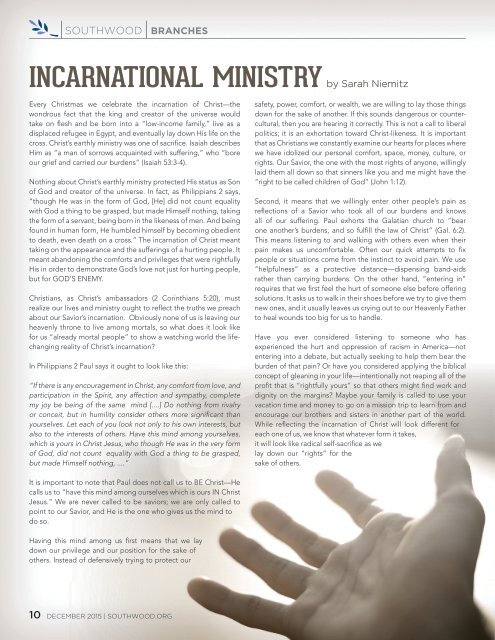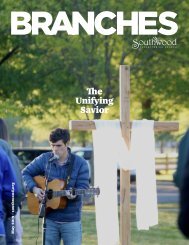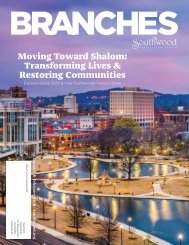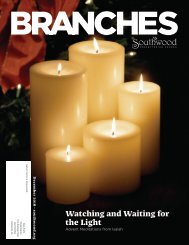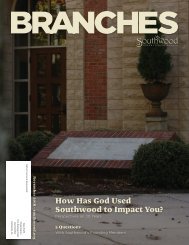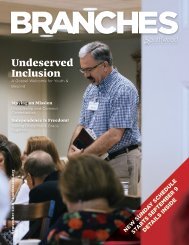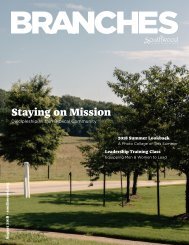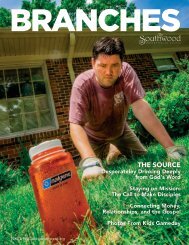BRANCHES December 2015
You also want an ePaper? Increase the reach of your titles
YUMPU automatically turns print PDFs into web optimized ePapers that Google loves.
SOUTHWOOD<br />
branches<br />
INCARNATIONAL MINISTRY by Sarah Niemitz<br />
Every Christmas we celebrate the incarnation of Christ—the<br />
wondrous fact that the king and creator of the universe would<br />
take on flesh and be born into a “low-income family,” live as a<br />
displaced refugee in Egypt, and eventually lay down His life on the<br />
cross. Christ’s earthly ministry was one of sacrifice. Isaiah describes<br />
Him as “a man of sorrows acquainted with suffering,” who “bore<br />
our grief and carried our burdens” (Isaiah 53:3-4).<br />
Nothing about Christ’s earthly ministry protected His status as Son<br />
of God and creator of the universe. In fact, as Philippians 2 says,<br />
“though He was in the form of God, [He] did not count equality<br />
with God a thing to be grasped, but made Himself nothing, taking<br />
the form of a servant, being born in the likeness of men. And being<br />
found in human form, He humbled himself by becoming obedient<br />
to death, even death on a cross.” The incarnation of Christ meant<br />
taking on the appearance and the sufferings of a hurting people. It<br />
meant abandoning the comforts and privileges that were rightfully<br />
His in order to demonstrate God’s love not just for hurting people,<br />
but for GOD’S ENEMY.<br />
Christians, as Christ’s ambassadors (2 Corinthians 5:20), must<br />
realize our lives and ministry ought to reflect the truths we preach<br />
about our Savior’s incarnation. Obviously none of us is leaving our<br />
heavenly throne to live among mortals, so what does it look like<br />
for us “already mortal people” to show a watching world the lifechanging<br />
reality of Christ’s incarnation?<br />
In Philippians 2 Paul says it ought to look like this:<br />
“If there is any encouragement in Christ, any comfort from love, and<br />
participation in the Spirit, any affection and sympathy, complete<br />
my joy be being of the same mind [....] Do nothing from rivalry<br />
or conceit, but in humility consider others more significant than<br />
yourselves. Let each of you look not only to his own interests, but<br />
also to the interests of others. Have this mind among yourselves,<br />
which is yours in Christ Jesus, who though He was in the very form<br />
of God, did not count equality with God a thing to be grasped,<br />
but made Himself nothing, ....”<br />
It is important to note that Paul does not call us to BE Christ—He<br />
calls us to “have this mind among ourselves which is ours IN Christ<br />
Jesus.” We are never called to be saviors; we are only called to<br />
point to our Savior, and He is the one who gives us the mind to<br />
do so.<br />
Having this mind among us first means that we lay<br />
down our privilege and our position for the sake of<br />
others. Instead of defensively trying to protect our<br />
safety, power, comfort, or wealth, we are willing to lay those things<br />
down for the sake of another. If this sounds dangerous or countercultural,<br />
then you are hearing it correctly. This is not a call to liberal<br />
politics; it is an exhortation toward Christ-likeness. It is important<br />
that as Christians we constantly examine our hearts for places where<br />
we have idolized our personal comfort, space, money, culture, or<br />
rights. Our Savior, the one with the most rights of anyone, willingly<br />
laid them all down so that sinners like you and me might have the<br />
“right to be called children of God” (John 1:12).<br />
Second, it means that we willingly enter other people’s pain as<br />
reflections of a Savior who took all of our burdens and knows<br />
all of our suffering. Paul exhorts the Galatian church to “bear<br />
one another’s burdens, and so fulfill the law of Christ” (Gal. 6:2).<br />
This means listening to and walking with others even when their<br />
pain makes us uncomfortable. Often our quick attempts to fix<br />
people or situations come from the instinct to avoid pain. We use<br />
“helpfulness” as a protective distance—dispensing band-aids<br />
rather than carrying burdens. On the other hand, “entering in”<br />
requires that we first feel the hurt of someone else before offering<br />
solutions. It asks us to walk in their shoes before we try to give them<br />
new ones, and it usually leaves us crying out to our Heavenly Father<br />
to heal wounds too big for us to handle.<br />
Have you ever considered listening to someone who has<br />
experienced the hurt and oppression of racism in America—not<br />
entering into a debate, but actually seeking to help them bear the<br />
burden of that pain? Or have you considered applying the biblical<br />
concept of gleaning in your life—intentionally not reaping all of the<br />
profit that is “rightfully yours” so that others might find work and<br />
dignity on the margins? Maybe your family is called to use your<br />
vacation time and money to go on a mission trip to learn from and<br />
encourage our brothers and sisters in another part of the world.<br />
While reflecting the incarnation of Christ will look different for<br />
each one of us, we know that whatever form it takes,<br />
it will look like radical self-sacrifice as we<br />
lay down our “rights” for the<br />
sake of others.<br />
10 DECEMBER <strong>2015</strong> | SOUTHWOOD.ORG


